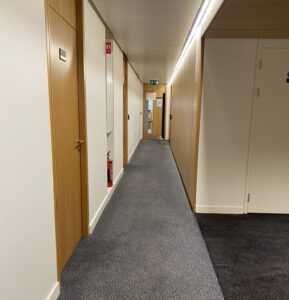Why they tell you not to work full-time when doing a PhD

Listen, they did warn me.
In the first week or so of starting my PhD at the University of Edinburgh, the zoom orientation room was filled with eager, new doctoral students. It was 2021, right in the midst of the COVID lockdowns, each of us glued to little screens, excited to jump into the doctoral world. The same slide deck that would have been delivered in a lecture hall was now online, with our program director at the helm, walking us through how to set ourselves up for success.
It was a lot of the same advice you might expect:
- speak with your supervisor often
- arrange your study plan
- prepare a timeline
- start your readings
- familiarize yourself with resources
But the main piece of advice was – do not work full-time.
Now, as an international student, I am restricted to 20 hours per week in the UK due to my visa. But in Canada, time is unlimited. And with COVID swirling away outside, and my job now fully remote, I kept working while studying and things certainly seemed to go okay for awhile. I wasn’t rushing through traffic, commuting, or racing from meeting to meeting. I had gaps in my schedule for the first time, and a steady routine that made it easy to peruse the library and find my way into my own research. There was no rush or pressure to deliver quality writing at the onset, and my supervisory meetings were all online.
But now as I near the end of year three, with COVID at our backs – things have changed.
Trying to balance it all
At the start of 2022, the university study spaces were mostly closed or on restricted hours (including the LLC postgraduate room), but eventually they began re-opening at the mid-point of my degree program. Travel restrictions were lifting. Pre-flight nose swabs and testing protocols came and went. Flight prices which were way down, now had spiked. And there were rumblings at my job, certainly amongst the corporate higher-ups that we’d be called back to our grey cubicles soon.
I had a decision to make. Keep trying to work remote, while juggling school, or figure something else out fast.

Study spaces wrapped in caution tape in 2022

Empty halls in 50 George Square
The trouble is, giving up your full-time income is tough. I’m a self-funded student, which the university defines as being independent of an official funding scheme. I did get scholarship funding, but that money came from Canadian government sources (see my post on how to fund your PhD). But as an older student, meaning someone who has a mortgage and a partner, I couldn’t de-couple myself from my house payments or my bills as quickly as I could when I was younger. I needed the money.
The stress of managing two competing outlook calendars, multiple email accounts, and time zones, eventually became unsustainable. Initially, I had decided to fly back and forth to the UK once restrictions were lifted, just to get a sense of what was happening on campus (nothing – it was grim) and how I wanted to finish off my second and third years. But as pressure mounted, and demands increased, I quickly realized that it was not possible to continue doing what I was doing if I had any hope of finishing on-time.
Stages of a doctorate
The beginning stages of a PhD are difficult because you feel like you are floundering around alot. You are investigating, hitting dead ends, reading books that turn out to be pointless, looking at source material that doesn’t seem to connect with anything. But as time goes by, and you narrow and refine what you are doing, the latter stages of a PhD are like weaving a web. One string connects to another. An idea links to a source you read yesterday. That source references a diagram. The puzzle starts coming together. But the minute you take a break, you start playing the game of two steps forward, one step back. Even a day’s break from working on the thesis means re-reading to catch-up. And re-reading your own work takes ages. What’s even harder is re-thinking your own thoughts.
After finishing my annual review this summer, my final one prior to my VIVA – I realize I’m entering a new phase of the degree. The sprint.
I can already feel the intensity of these coming months, which make-up the period of my so-called ‘write up year’. This is the time frame when I am meant to be putting together all the pieces of the puzzle – drafting, polishing and refining. I’m chipping off concepts I don’t need, pruning the tree of ideas so to speak, so what remains is a sleek, perfectly manicured garden. If I have any chance of passing my VIVA, this is the time when attention to detail must be laser-cut.
There’s no more floundering around or flopping in the seas of random thoughts. I’m at the start of Formula 1 grid, with 70 laps ahead, and six hundred tight corners. Crash and I fail. Spin out and I DNF. Let me tell you – finishing the third year feels like closing in on the end of the race – failure is not a f**king option. Everything is at stake.
Not everyone believes in you
The sprint period is also the time when I’ve had my biggest reality check. Not everyone believes in me. Not everyone understands what I am doing. Most people don’t know what my thesis is about. I’m wholly responsible, and the most invested in what’s at stake. At no other point in my academic career have I found such a pool of non-believers like at the sprint stage of the PhD.
I hear these phrases all the time now:
“You’ll be so glad when it’s over.”
“It will be a relief when it’s done.”
“When do you finish?”
These questions are throat-punchingly irritating, especially when it’s the same people saying them over and over again. And nobody says these things to undergrads or even master’s students. Those programs have finite end dates. You do the exam, and you’re done. Schools out. That’s not the case here, and it’s hard to grasp the intention behind these comments.

Hanging out with friends who know the trials and tribulations of PhD life
I can’t speak for every PhD student but for me, I won’t be glad when it’s over. Why? Because I know what happens when it’s over – sadness. Feelings of being lost. Losing a community that I have loved spending every minute in. It means losing access to my brilliant supervisor, not having our regular meetings, and being on the outside of something I was once on the inside of. It won’t be a relief when I’m done. Because I will never be done. I’m doing a degree in writing, to be a writer, and I’ll keep writing until the bitter end.
As for when I finish, the only way I can finish is to focus. And the only way to focus is to have people believe in my ability to get this degree done. There are people – friends, strangers, family – even coworkers I know very little about – who believe in me far more than others. There is no pattern of who believes in me, versus who doesn’t. Random people become my biggest cheerleaders. A family friend becomes my biggest critic. Close friends are sometimes supportive but also kind of confused, and whatev’s about it. Some work colleagues think what I’m doing is incredibly impressive, others could care less. My current work supervisor has more interest in the weather. Not everyone is going to believe in me. It’s genuinely one of the strangest parts of doing a doctoral degree – especially as a female.
And don’t even get me started on the people who say to my face, “well, I’m not going to call you doctor.”
Sprinting
I don’t have it all figured out yet, and I’m still formulating my working situation. But one of the ways writer’s process difficult situations is to work our way through it – or better, write our way through it. Sometimes making a big decision or change is daunting, but now that I am at the sprint, I have to choose to race or to sit on the sidelines. And who the hell wants to watch, when you can win?



